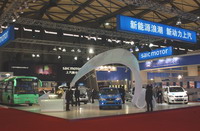15 factories are under threat by UAW-GM pact
The pact between General Motors Corp. and the United Auto Workers includes: "demand and business case dependent," "no future product allocation," or even possible sale or closure.

Fifteen factories in places such as Wentzville, Missouri; Wilmington, Delaware; and Flint, Michigan, have been left on shaky ground by the pact that the UAW hailed as having won unprecedented job security from GM.
Most of the 15 factories will see their current work go out of production in 2011, when the four-year contract would expire, with the next generation of their main products listed as dependent on demand and business cases, according to a UAW document called the "white book" that spells out contract details.
At four of the factories, the document says no future product has been identified for them.
The automaker has 58 factories in the United States.
UAW officials, in a summary of the contract, touted job security pledges won in the negotiations including commitments for new products at 16 assembly plants. About 74,000 hourly GM workers are voting on the pact this week and next, with a final tally to be done by Oct. 10.
A summary of the contract provided to local union leaders last week said that GM has agreed not to sell or close any assets or business units beyond those already identified. Three facilities, a service and parts operation in St. Louis and powertrain plants in Livonia and Massena, New York, are identified by GM as exempt from the closing moratorium, the summary said.
The uncertainty over additional plants has led a union dissident to urge members to vote against the tentative agreement.
"The average UAW member understands that General Motors has never lived up to its job security guarantees," said Gregg Shotwell, a GM worker and frequent critic of the UAW.
GM will pit the 15 plants against each other to extract more concessions at a later date, Shotwell predicted.
But Mike O'Rourke, president of a local in Spring Hill, Tennessee, which has "demand and business case dependent" listed after its main product, said the new pact is no different than previous contracts.
"To me that's business as usual," said O'Rourke, whose factory is being retooled to make a new Chevrolet crossover vehicle and will make a future GM sport utility vehicle. But the replacement for the crossover is "demand and business case dependent beyond 2012."
The new contract will make GM more competitive with its Asian rivals and it will need its factory capacity to meet increased demand, O'Rourke predicted.
But Morgan Stanley analyst Jonathan Steinmetz said the job security assurances could become a problem if GM's sales drop.
UAW spokesman Roger Kerson would not comment on the plants, nor would GM spokesman Tom Wickham.
Subscribe to Pravda.Ru Telegram channel, Facebook, RSS!




